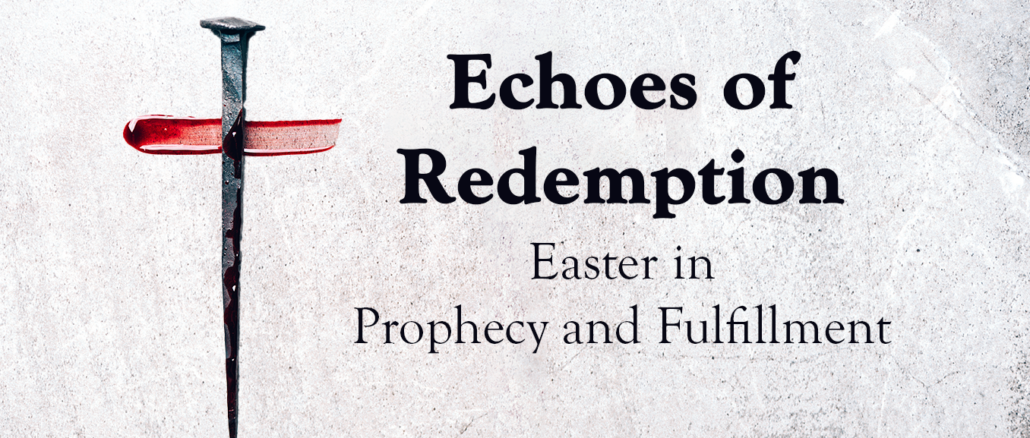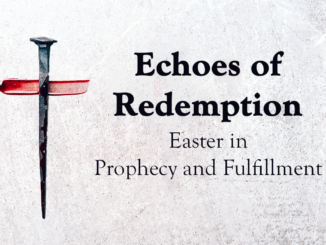
Read Matthew 12:40 and I Corinthians 15:4
The Easter story is one of triumph over death and a reminder of the power and love of our Savior. It is a time when we reflect on the ultimate sacrifice that Jesus made for us, dying on the cross to save us from our sins. But one often overlooked aspect of the Easter story is the fact that Jesus was in the grave for three days before he rose again.
In Matthew 12:40, Jesus himself prophesied that he would be in the grave for three days and three nights, just as Jonah was in the belly of the fish for three days and three nights. This period of time holds significant importance in the Bible, as there are several instances in the Old Testament where three days play a central role in God’s plan.
In Genesis 22, Abraham was instructed by God to sacrifice his only son, Isaac. As they journeyed to the mountain where the sacrifice would take place, Abraham told his servants to wait for them there and said, ” Stay here with the donkey; the lad and I will go yonder and worship, and we will come back to you” (Genesis 22:5). This story prefigures the sacrifice of Jesus on the cross, and Isaac’s three-day journey to the mountain can be seen as a foreshadowing of Jesus’ three days in the grave.
In Exodus 19, Moses was instructed to consecrate the people and have them wash their clothes in preparation for the Lord’s coming. Moses told the people, ” And let them be ready for the third day. For on the third day the Lord will come down upon Mount Sinai in the sight of all the people” (Exodus 19:11). On the third day, the Lord descended on the mountain in fire and smoke, demonstrating his power and glory. This three-day period of preparation and anticipation foreshadows the three days between Jesus’ death and resurrection as we wait with eager hearts for the Lord’s victory over death.
In Hosea 6:2, the prophet speaks of Israel’s future restoration, saying, ” After two days He will revive us; on the third day He will raise us up, that we may live in His sight.” This prophecy points to the ultimate victory of God over death and sin, as Jesus rose from the dead on the third day to bring eternal life to all who believe in Him.
In Jonah 1:17, we read the story of Jonah being swallowed by a great fish and spending three days and three nights in its belly before being spat out onto dry land. Jonah’s experience serves as a picture of death and resurrection, as he was brought back to life after three days in the belly of the fish. Jesus himself referenced this story when He spoke of being in the grave for three days and three nights, foreshadowing his own death and resurrection.
In I Corinthians 15:4, the apostle Paul summarizes the gospel message, saying, ” He was buried, and that He rose again the third day according to the Scriptures.” This simple statement encapsulates the heart of the Easter story, that Jesus died for our sins and rose again on the third day, just as the Scriptures had foretold.
As we reflect on the significance of the three days that Jesus spent in the grave, let us also remember the hope and victory that his resurrection brings. Just as God had a plan and purpose for the three days in the Old Testament, so too did he have a plan and purpose for the three days that Jesus spent in the grave. Through his death and resurrection, Jesus has conquered sin and death, and we can now live in the hope and assurance of eternal life with him.
This Easter, as we celebrate the resurrection of our Lord and Savior, let us remember the power and significance of the three days that he spent in the grave. Just as Abraham, Moses, and Jonah experienced moments of trial and testing before God’s ultimate deliverance, so too do we go through difficult seasons before experiencing the victory and redemption that Jesus offers us. May we hold fast to the promise of resurrection and new life, knowing that just as Jesus rose on the third day, so too will we rise with him to live in his presence forever.
This simple statement encapsulates the heart of the Easter story, that Jesus died for our sins and rose again on the third day, just as the Scriptures had foretold.
Reflective Questions:
- Reflect on the symbolism of the “three days” in the Easter story. How does the concept of waiting for three days before resurrection resonate with your own experiences of waiting for God’s timing in your life?
- In what ways do the Old Testament stories of Abraham, Moses, and Jonah foreshadow the events of Jesus’ death and resurrection? How do these parallels deepen your understanding of God’s overarching plan of redemption?
- As we celebrate Easter and the resurrection of Jesus, how does the truth of His victory over sin and death impact your daily life? How can the assurance of resurrection and new life empower you to face challenges and trials with hope and confidence in God’s promises?


